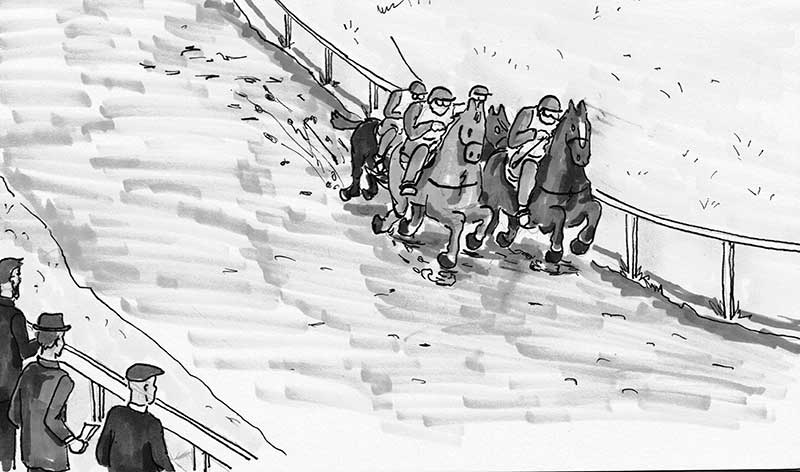He went to the desk near the window, pulled in his chair twice and read off some words from the sheet on the drum of his typewriter.
—Sit down. Excuse me, he said over his shoulder, the dictates of common sense. Just a moment.
He peered from under his shaggy brows at the manuscript by his elbow and, muttering, began to prod the stiff buttons of the keyboard slowly, sometimes blowing as he screwed up the drum to erase an error.
Stephen seated himself noiselessly before the princely presence. Framed around the walls images of vanished horses stood in homage, their meek heads poised in air: lord Hastings’ Repulse, the duke of Westminster’s Shotover, the duke of Beaufort’s Ceylon, prix de Paris, 1866. Elfin riders sat them, watchful of a sign. He saw their speeds, backing king’s colours, and shouted with the shouts of vanished crowds.
—Full stop, Mr Deasy bade his keys. But prompt ventilation of this allimportant question…
Where Cranly led me to get rich quick, hunting his winners among the mudsplashed brakes, amid the bawls of bookies on their pitches and reek of the canteen, over the motley slush. Fair Rebel! Fair Rebel! Even money the favourite: ten to one the field. Dicers and thimbleriggers we hurried by after the hoofs, the vying caps and jackets and past the meatfaced woman, a butcher’s dame, nuzzling thirstily her clove of orange.
Shouts rang shrill from the boys’ playfield and a whirring whistle.
Again: a goal. I am among them, among their battling bodies in a medley, the joust of life. You mean that knockkneed mother’s darling who seems to be slightly crawsick? Jousts. Time shocked rebounds, shock by shock. Jousts, slush and uproar of battles, the frozen deathspew of the slain, a shout of spearspikes baited with men’s bloodied guts.
—Now then, Mr Deasy said, rising.

